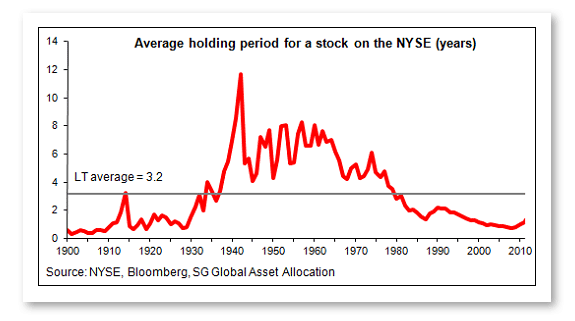"Someone's sitting in the shade today because someone else planted a tree long time ago" - Warren Buffett
 Last week I was reading a whitepaper from MFS Investment Management about the benefits of investing on a longer horizon.
Last week I was reading a whitepaper from MFS Investment Management about the benefits of investing on a longer horizon.
Corporate citizenship leaders, take note. There is more and more being written about the need for investors to take a longer view. This perspective presents a potential opportunity for companies that are willing to make longer-term investments in environmental, social, and governance dimensions of their businesses to improve their operating environments so that they can sustain positive returns for the longer term.
The article points out that investors are increasingly short term in their orientation and stocks are being held for record-short periods of time (see figure below). Despite this trend, the article points out that company fundamentals do not change nearly as much as equity market prices, and herein lies the opportunity for investors with a longer-term orientation—and for the companies they invest in. The paper points out that many can ride the swings of the market for the short term, but it is over the long term that differentiated performance emerges—both for companies and for investors. So how can you help make sure your company’s plan for long-term value creation is promoted within the company and recognized beyond its walls?
Don’t forget the “Because…”
The MFS article notes that the focus on quarterly earnings estimates is a driver of much of the coverage about companies in the business press and notes the lack of longer-term estimates (3+ years). Corporate citizenship teams can be working with investor relations, finance, and operations teams to describe the investments they are making and reasons that they are important for the long term. Creating an alternative narrative and timeline is part of your work. It is important not only to describe what you are doing, but also why you are doing it.
In his book Influence: The Psychology of Persuasion, Robert Cialdini describes how people can be influenced to be much more accepting of new conditions if they are given a reason as to why they should. He describes an experiment conducted by social psychologists Langer, Chanowitz, and Blank, which illustrates how compliant people will be with a request if they hear words that sound like they are being given a reason, even if no actual reason is provided. The experimenters approached people standing in line to use a photocopier with one of three requests:
- "Excuse me. I have 5 pages. May I use the Xerox machine because I'm in a rush?"
- "Excuse me. I have 5 pages. May I use the Xerox machine?" or
- "Excuse me. I have 5 pages. May I use the Xerox machine because I have to make some copies?"
When given the request plus a reason, 94 percent of people asked complied with the request. When given the request without a reason, only 60 percent complied. But when given the request with what sounds like a reason but isn't, compliance jumped back to 93 percent.
Have it both ways.
Of course the more significant the action you are asking your audience to take, the more closely they will listen to the reason you are giving. So keep in mind also that social science tells us that most people are more influenced by wanting to avoid loss than they are by the possibility of a gain. This is played out in multiple studies that suggest that the minority of people who are able to delay gratification are more likely to experience many aspects of success in life. To get the most support for your long-term vision, make sure you provide both frames for your audience. As you chart your company’s plans for the future, describe what you are choosing to give up today in order to be sitting in the shade tomorrow and how that will benefit your investors, employees, and customers.
Our challenge as a society is to get to a balance of actions and forego consuming today what we cannot pay for until Tuesday (either at the gym or the bank), and instead apply that to a greater reward tomorrow. Corporate citizenship leaders have a role to play in reinforcing the benefits of this longer term calculation—for the benefit of society and the good of the company.